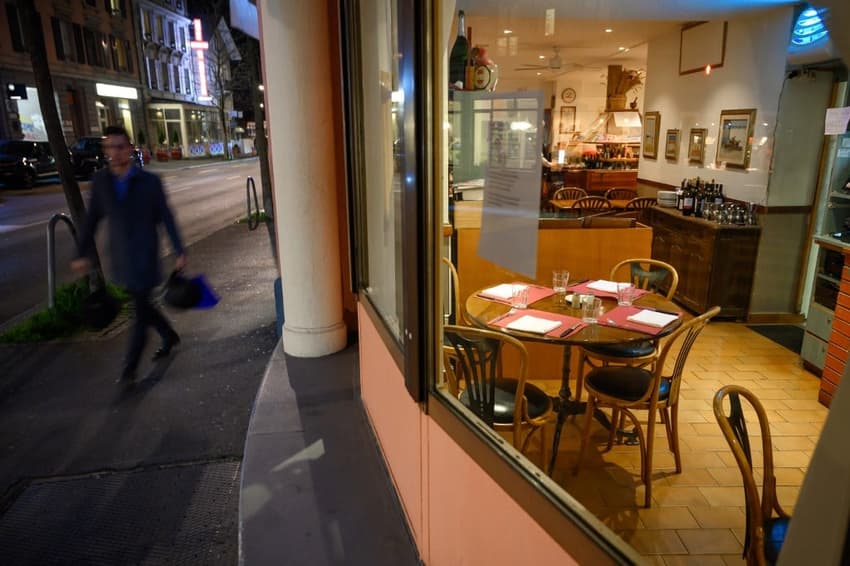UPDATE: Swiss restaurant patrons will not have to divulge their personal details

As pubs and restaurants re-open on May 11th, clients will not be required to provide their names and telephone numbers, as previously announced.
Authorities said earlier this week that clients will have to give their full name and contact information to be allowed to enter bars and restaurants from May 11th.
This unprecedented measure was to be implemented so that people can be contacted if an outbreak is subsequently detected.
However, the federal authorities backtracked on that requirement on Thursday.
According to Adrian Lobsiger, the government's data protection officer, there is no legal basis for imposing on restaurateurs an obligation to identify their customers.
"This can only be done on a voluntary basis," he said in an interview with Le Temps newspaper.
"If the Federal Council wants to compel restaurateurs to collect personal data, it must create a legal framework at the federal level," Lobsiger added.
READ MORE: Coronavirus tracking: Swiss restaurants and bars to demand customer names and phone numbers
However, Lobsiger said that from the legal standpoint, the virus tracking application DP3T, currently being developed by the Federal Polytechnic Institute of Lausanne (EPFL), is a better alternative to trace the chains of possible Covid-19 contaminations.
Based on Bluetooth technology, the DP3T records contacts lasting more than 15 minutes, at a distance of less than two metres. If any of these contacts are later infected by the coronavirus, the owner of the phone receives an alert.
"The system is as decentralised as possible, it is voluntary, and anonymity is preserved. But we still have to examine the application in practice," Lobsiger noted.
A first version of the app should be ready next week. A final version should follow by the end of the month.
However, even though restaurants are no longer obligated to collect customers' data, they must implement appropriate social distancing and hygiene measures.
These include spacing of two metres between tables and no groups larger than four (other than families). The wearing of masks, however, will remain optional.
Comments
See Also
Authorities said earlier this week that clients will have to give their full name and contact information to be allowed to enter bars and restaurants from May 11th.
This unprecedented measure was to be implemented so that people can be contacted if an outbreak is subsequently detected.
However, the federal authorities backtracked on that requirement on Thursday.
According to Adrian Lobsiger, the government's data protection officer, there is no legal basis for imposing on restaurateurs an obligation to identify their customers.
"This can only be done on a voluntary basis," he said in an interview with Le Temps newspaper.
"If the Federal Council wants to compel restaurateurs to collect personal data, it must create a legal framework at the federal level," Lobsiger added.
READ MORE: Coronavirus tracking: Swiss restaurants and bars to demand customer names and phone numbers
However, Lobsiger said that from the legal standpoint, the virus tracking application DP3T, currently being developed by the Federal Polytechnic Institute of Lausanne (EPFL), is a better alternative to trace the chains of possible Covid-19 contaminations.
Based on Bluetooth technology, the DP3T records contacts lasting more than 15 minutes, at a distance of less than two metres. If any of these contacts are later infected by the coronavirus, the owner of the phone receives an alert.
"The system is as decentralised as possible, it is voluntary, and anonymity is preserved. But we still have to examine the application in practice," Lobsiger noted.
A first version of the app should be ready next week. A final version should follow by the end of the month.
However, even though restaurants are no longer obligated to collect customers' data, they must implement appropriate social distancing and hygiene measures.
These include spacing of two metres between tables and no groups larger than four (other than families). The wearing of masks, however, will remain optional.
Join the conversation in our comments section below. Share your own views and experience and if you have a question or suggestion for our journalists then email us at [email protected].
Please keep comments civil, constructive and on topic – and make sure to read our terms of use before getting involved.
Please log in here to leave a comment.